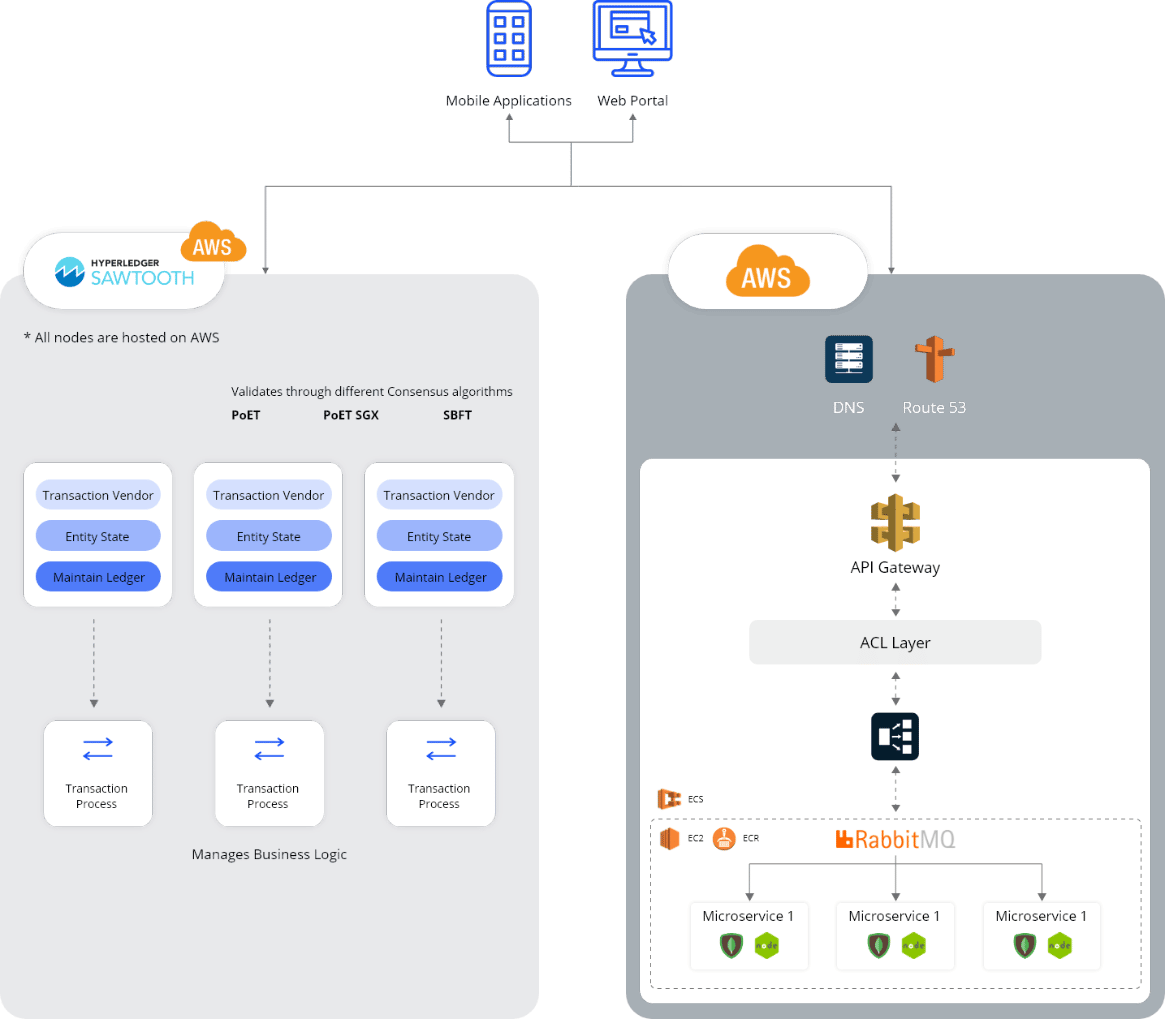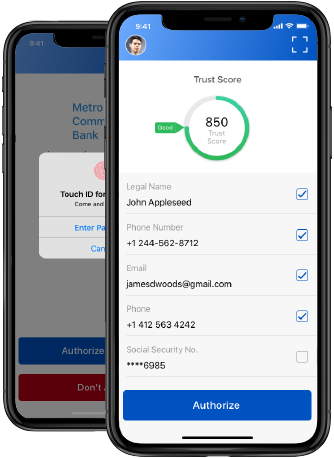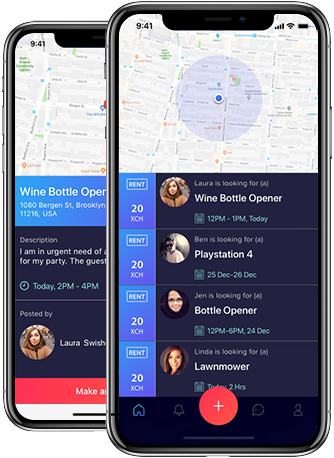dApp Development Company
We design and develop decentralized applications which are secure and scalable for a wide range of industries, with a special focus on areas such as DeFi, NFTs and gaming. Our dApp developers convert your ideas into robust, ready-to-use applications that can offer an unparalleled user experience.

Fullstack Developers
Digital Solutions
Blockchain Projects
Total Years of Experience
Our dApp Development Services
As a dApp development company, we help businesses gain an edge in the competitive blockchain landscape with robust smart contracts, decentralized exchanges, NFT marketplaces, metaverse virtual worlds and a range of other Web 3.0 products.
MVP Consulting
Our dApp Development Experts stay updated with the emerging dApp market trends and can help you analyze whether your idea will succeed. We identify the possible stakeholders, define technical components and suggest the right blockchain platform as per the client’s requirements.
User Interface Design
From the initial ideation phase to the creation of interactive prototypes and a robust final product, we follow a highly structured and systematic user interface design process. We have a proven track record of creating successful apps for our clients and has delivered 100+ dApps since 2007.
Decentralized Exchange Development
We build highly scalable and customized DEX platforms that support peer-to-peer transactions eliminating the need for intermediaries. Our exchange platforms can connect to external exchanges via distributed shared order books and APIs.
dApp Consultation
Our dApp development experts stay updated on the emerging dApp market trends, helping you assess your idea’s prospects of success. We offer thorough guidance on your project’s technical and business aspects and help you select the right blockchain platform for development.
Smart Contracts
Our smart contract development services include writing, testing and deploying contracts on various blockchain protocols like Ethereum, Polkadot, Polygon and others. We also optimize your existing smart contracts to support any desired functionality.
Decentralized Gaming Apps
We create next-gen gaming dApps using AR, VR, spatial computing technologies and 3D creation tools such as Unity and Unreal Engine. Our interactive gaming applications also support the play-to-earn model.
dApp Porting
We offer complete support for dApp porting, allowing your application to be seamlessly migrated to any blockchain platform that meets your specific needs for security, scalability and stability without affecting your business.
dApp Upgrade Services
We provide comprehensive and timely upgrade services to prevent dApp downtimes and facilitate a great user experience, to ensure your business operations continue uninterrupted.
Prominent dApp Use Cases We Focus On
NFT Ticketing dApps
Gaming dApps
Players have complete control over their in-game assets because of gaming DApps. They also provide users the chance to earn money from these objects outside of the game.
Social Media dApps
DeFi dApps
DeFi DApps provide quick transaction processing, low-to-no credit checks, and the opportunity to use virtual assets as collateral.
The dApp Architecture

dApp Development Platforms we work on

Ethereum
An open-source, decentralized public platform with smart contract functionality.

Polygon Matic
Polygon (MATIC) is an Ethereum token that boosts the Polygon Network.

Polkadot
Polkadot is a next-generation blockchain protocol to regulate interoperable dApps.

Avalanche
Avalanche is a robust dApp development platform that uses the Golang programming language.

NEAR
NEAR is a layer-1 blockchain based on the PoS consensus algorithm.

Cosmos
Cosmos is a decentralized network of multiple blockchains driven by BFT consensus.

Solana
Solana is a public blockchain network that achieves consensus with PoS and PoH.

Stellar
An open platform to build decentralized financial products

XDC
The XDC Network is a hybrid blockchain that uses XDPoS consensus.

Binance
Binance is a decentralized network based on BFT and Delegated PoS consensus.
Technology Tools that pillar our dApp Development Services

We use Geth to launch Ethereum node, transfer funds between addresses, explore block history, mine Ether and create contracts.




Our dApp Development Company uses Truffle which offers a development environment and asset pipelines for Ethereum application development. It allows custom deployments for many public and private networks.

We create, deploy, debug and test smart contracts written in Solidity language on Remix, a browser-based IDE. It can connect with Ethereum Blockchain via Metamask.
Back-end Programming Languages We Understand

Solidity
We write smart contracts for blind auctions, voting, multi-signature wallets and crowdfunding in Solidity programming language. Solidity is an object-oriented language that supports libraries, inheritance and user-defined types.

Golang

Rust
Rust is a multi-paradigm, high-performance, statically typed programming language. With a primary emphasis on safety and performance, this language assists developers in developing stable and resilient apps.

JavaScript

Java

Node.js
Front-end Development Stack We Follow

Angular.JS

BootStrap

jQuery

React
We use React, an open-source JavaScript Library, to build user interfaces for single page applications. It can be used for managing the view layer for both web and mobile apps.
We leverage high-performance cloud services to deploy and manage enterprise dApps

AWS
Our dApp Development Team uses Amazon Web Services (AWS) to deploy dApps built on various platforms including Hyperledger Fabric/Sawtooth, Ethereum and Corda worldwide in a few clicks.

Google Cloud

Microsoft Azure

Digital Ocean
Our dApp Portfolio
dApp for Identity Management

dApp for Identity Management
EarthID is a decentralized “Identity Management System” on the blockchain that is used for online or offline user identification exchange. Earth ID eliminates the need for different identity methods and instead uses only ONE universal way of identification. EarthID is secured, reliable and can only be controlled and modified by the owner.


dApp for Product Exchange
Xchange is a barter system dApp developed on the blockchain. Xchange decentralized app is one of the biggest and revolutionary ideas in the shared economy on the blockchain platform. The app enables users to get in touch with various renters and exchange products using XCH tokens.

dApp for Healthcare
We have built a dApp for Healthcare industry that allows users to share their medical records with hospitals and other users without revealing their identities. The app ensures the authenticity of health records by storing it on the blockchain.


dApp for Pharma Supply Chain
Our dApp Development Company has developed a pharma supply chain platform on blockchain for international aid distribution. The decentralized app allows its users to completely trace the distribution of drugs from the warehouse through the last mile.
OUR dApp DEVELOPMENT PROCESS
Blockchain Ideation
- Brainstorm idea and business requirements
- Identify any existing system migration to Distributed Ledger
- Prioritize use cases in “Fail fast”, “MVP” & “v2.0”
- Define off chain & on chain business entities
- Define technical component
- Roadmap of the product
Proof of concept development
- Identify technology Hyperledger, Ethereum, HashGraph or Lightening Networks
- Pick a simplest and essential use case for POC
- Develop a PoC
Visual & Technical Design
- Create User interface design for each software component
- Design technical Architecture
- Identify the level of focus on scalability and Security
- Document technical GDPR compliance requirement
- Create sprints and delivery milestones

Development
- Pre-alpha
- Alpha
- Beta
- Release Candidate
- Production
Deployment
- Provisioning
- Deploy on Main Chain
- If, Hybrid solution
- Cloud deployment
- App Store deployment
Upgrades
- Requirements gathering
- Backlog prioritization
Big Brands Trust Us


Meet Our Blockchain Experts
Our Engagement Models

Dedicated Development Team
Our developers leverage cutting-edge cognitive technologies to deliver high-quality services and tailored solutions to our clients.

Team Extension
Our team extension model is designed to assist clients seeking to expand their teams with the precise expertise needed for their projects.

Project-based Model
Our project-oriented approach, supported by our team of software development specialists, is dedicated to fostering client collaboration and achieving specific project objectives.
Get Started Today
1. Contact Us
Fill out the contact form protected by NDA, book a calendar and schedule a Zoom Meeting with our experts.
2. Get a Consultation
Get on a call with our team to know the feasibility of your project idea.
3. Get a Cost Estimate
Based on the project requirements, we share a project proposal with budget and timeline estimates.
4. Project Kickoff
Once the project is signed, we bring together a team from a range of disciplines to kick start your project.
Start a conversation by filling the form
Once you let us know your requirement, our technical expert will schedule a call and discuss your idea in detail post sign of an NDA.
All information will be kept confidential.
FAQs
What are dApps?
dApps (Decentralized applications) run on a peer-to-peer network of computers instead of a single computer. They are similar to a conventional web application in a way that its front end uses the same technology to represent the page. But the backend uses smart contracts to connect to the blockchain network instead of an API connecting to the database.
Advantages of dApps over Traditional apps
- dApps are tamperproof and records stored in it are unalterable, protecting the application from hacking or intrusions.
- Decentralized apps are governed through autonomy and changes made in the applications are decided through consensus of all members in the network.
- Unlike traditional apps, decentralized applications i.e. dApps do not rely on a single server and therefore, it prevents the risk of central point of failure.
What type of dApp suits your business case?
- Type 1: dApps with their own blockchain, for example, Bitcoin.
- Type 2: Using the blockchain of Type 1, these dApps are protocols with token essential for their functions, for example, Omni protocol.
- Type 3: These dApps use Type 2 dApp’s protocol, for example, SAFE network issuing Safecoins using Omni Protocol.
What is dApp Development?
dApp Development is the process of building decentralized applications with backend code running on a decentralized peer-to-peer network. The difference between traditional and dApp Development is the way programming is done. The coding of dApp is more rigorous than traditional app development as the code of the smart contract is unchangeable once it is commenced on the mainnet.
We provide dApp development services that include decentralized exchange development, smart contracts development, dApp consulting, dApp porting and dApp upgrade services.
What are the steps in dApp Development Process?
Here are the steps involved in the dApp Development Process:
- Analysis and Ideation
Firstly, you need to analyze whether your business use case needs to be built on the decentralized network or not. Once you decide that you require a dApp for your business, you need to identify the technology components required to develop a dApp. Also, define on-chain and off-chain business entities - Proof of Concept
After analyzing and identifying the tech components, the next step could be developing a PoC to test the viability of the proposed solution with minimum features. - Visual Interface and Technical Design
The next step is to create a user interface design for each software component and design technical architecture to identify the working of a dApp. - Development and Deployment
It is a crucial step in dApp development where blockchain developers start building the application using the agile development methodology. After the app is tested on the test network. developers deploy them on the main net and cloud platforms.
Why choose LeewayHertz as your dApp development company?
LeewayHertz is a well-known and experienced dApp development company that offers a range of services for businesses looking to develop decentralized applications. Some reasons why one may choose LeewayHertz as their dApp development company include:
Technical Expertise: LeewayHertz has a team of skilled developers and blockchain experts who have a deep understanding of the technology and can provide high-quality dApp development services.
Industry Experience: With years of experience in developing decentralized applications, LeewayHertz has a strong track record of delivering successful dApp projects for a variety of industries.
Comprehensive Services: LeewayHertz offers a full suite of dApp development services, from concept to deployment, to help businesses bring their ideas to life.
Strong Focus on Security: Decentralized applications require a strong focus on security, and LeewayHertz has a reputation for delivering secure and reliable dApps that meet the highest security standards.
Customer Satisfaction: LeewayHertz is committed to delivering high-quality services and ensuring customer satisfaction, and has received positive feedback from clients for their dApp development services.
Insights
How to create a Permissioned Blockchain?
A permissioned blockchain bridges the gap between public and private blockchains by allowing users’ data to flow safely and transparently.
A Comprehensive Guide to Smart Contract Auditing
Smart contract audits are an integral part of the smart contract development process. Take a closer look at how it can be beneficial to your project.
Top Managed Blockchain Solutions 2024
Follow our article to get an insight into all the top-managed blockchain solutions. Managed blockchain solutions help businesses to leverage the advantages of blockchain technology seamlessly.










